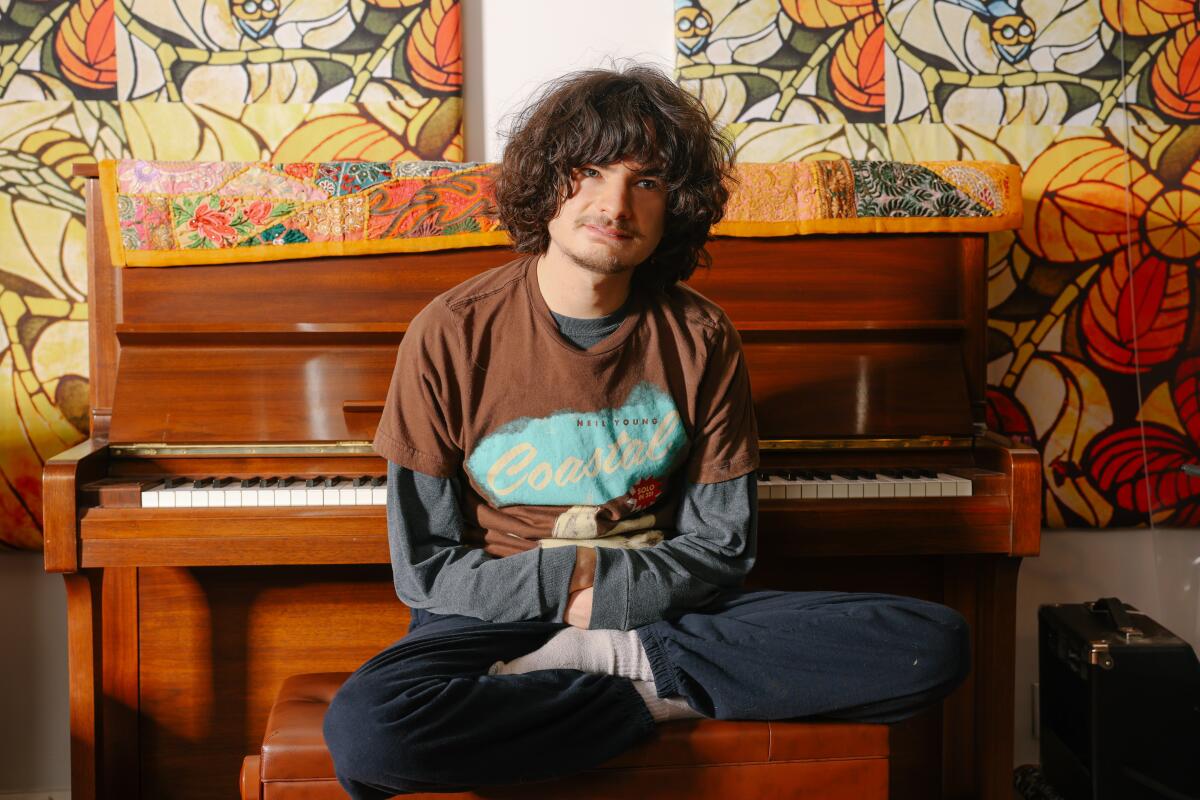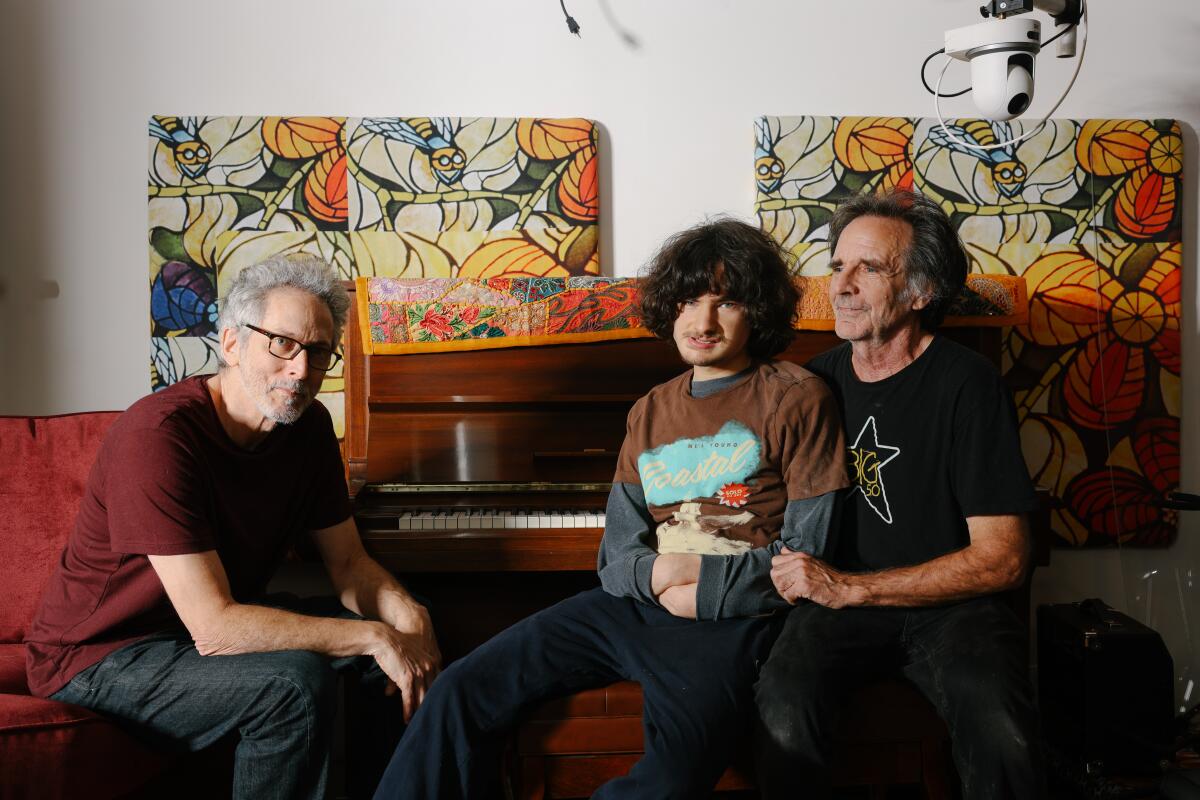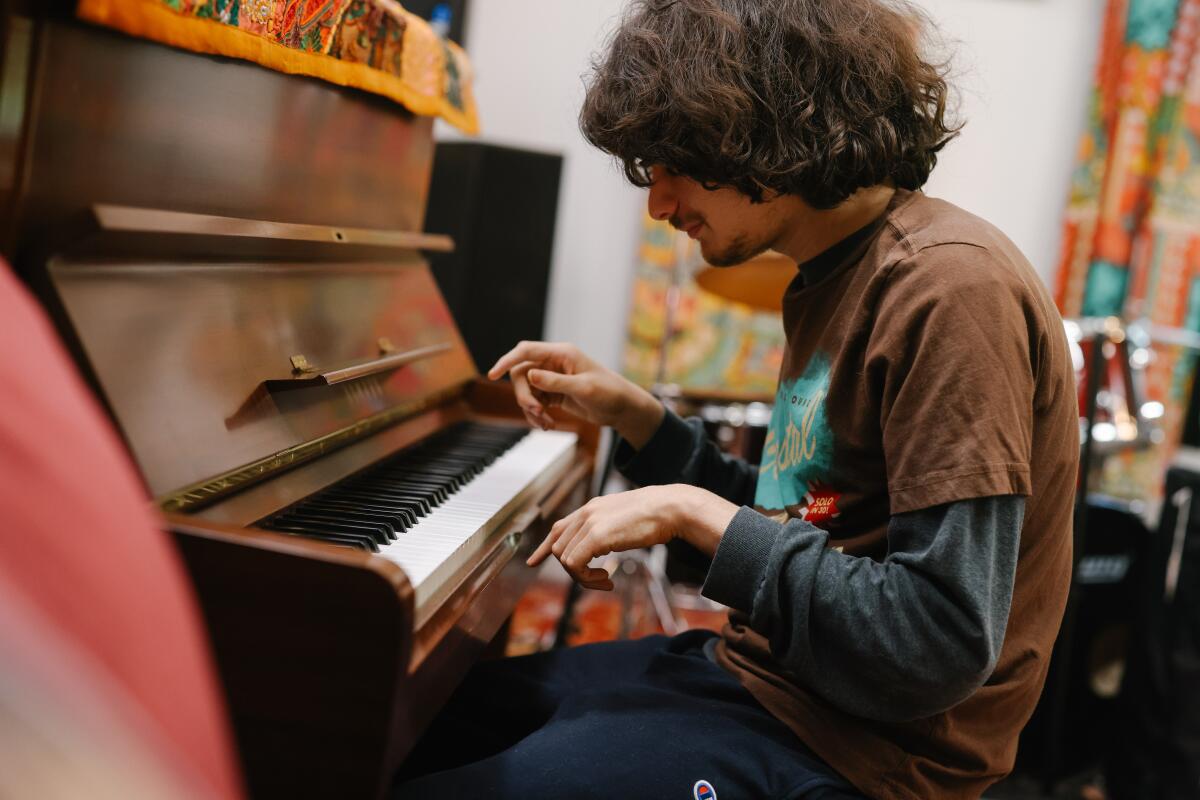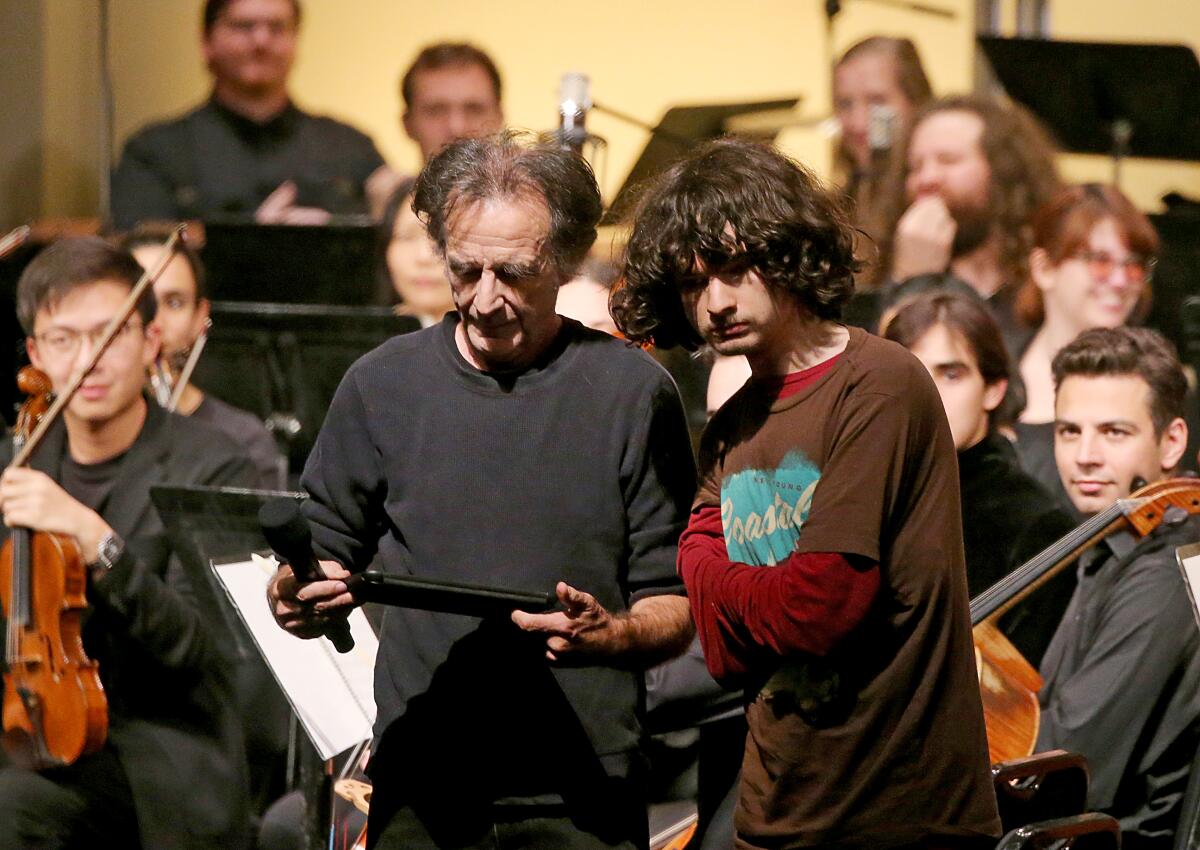
The orchestra tuned as the last musicians ambled into Schoenfeld Hall at USC. On a muggy Sunday afternoon in September, they were rehearsing a new symphony, “Unforgettable Sunrise,” by an unknown local composer. Conductor Daniel Newman-Lessler snapped them all to attention: Today they’d run through the symphony’s second movement, “Page Turner.”
“This is more like a six than a compound four,” Newman-Lessler said, referring to the segment’s tricky time signature. At his signal, the strings went off on a pizzicato run, buoyed by harps and congas, before dissolving into a bass drum pulse beneath simmering horns. Newman-Lessler applauded the percussionists. “That’s great, can we all have that kind of internal 16th note shaker going?” They obliged, lifting the piece into a strong, danceable rhythm.
“Unforgettable Sunrise’s” composer, 19-year-old Jacob Rock, listened from the far side of the room. Jacob, dressed in a brown Neil Young T-shirt, sat beside his father, Paul Rock, and watched through a mop of brown hair that nearly covered his eyes. Jacob was nearly vibrating with excitement as the strings rippled and marimba clattered. He had lived with this music for years, unable to get anyone to hear it. Now it was finally out.
After the rehearsal, Paul, 64, spoke about his son, bewildered by the scale of the music they’d just heard: “He’s been invisible to the world until this,” Paul said.
Jacob Rock lives with profound non-oral autism. His condition makes him all but unable to speak, with other debilitating physical effects inhibiting communication and socializing. Until three years ago, he’d been unable to speak with his family outside of physical gestures, which often conveyed deep frustration and self-harm.
In 2020, a breakthrough utilizing text-to-voice software revealed that Jacob had a deep acuity and sensitivity to language and art. He could now verbally communicate with his parents, and they could learn about his inner world.
Jacob revealed that since childhood, he’d been composing a symphony. He had all the arrangements and melodies locked in place. He couldn’t write notation or play the instruments his music required, but he could describe what he heard. Could they help him find a way to play it?
Jacob’s symphony, which he co-wrote with composer Rob Laufer, debuted Saturday at the Alex Theatre in Glendale. It reveals much about the inner lives of people with non-verbal autism, worlds that often remain devastatingly inexpressible. Many suffer in isolation their whole lives.
Yet music exists to say the unknowable, and on Saturday night, hundreds of people finally heard Jacob’s mind at work.
“Failure was the thing that always frightened me, and not being able to communicate was the greatest barrier to success,” Jacob said, through his text-to-speech software in an interview at his family’s home in Northeast L.A. He only had the stamina to type for a few minutes, but he was eager to talk about his work: “I want people to see the pain in my life and bad times, and know there’s hope.”

For all the ground broken in understanding and treating autism today, so much is still unknown about where it comes from, why it manifests as certain differences and disabilities, and — in some cases — why it can be consonant with incredible skill in fields like music or mathematics. Public figures like actor Anthony Hopkins and activist Greta Thunberg have spoken about how their Autism Spectrum Disorder has influenced their work.
The Centers for Disease Control and Prevention defines Autism Spectrum Disorder as “a developmental disability caused by differences in the brain. Some people with ASD have a known difference, such as a genetic condition. … Scientists believe there are multiple causes of ASD that act together to change the most common ways people develop.
“Some people with ASD may have advanced conversation skills whereas others may be nonverbal,” the CDC says. “Some people with ASD need a lot of help in their daily lives; others can work and live with little to no support.”
Since Jacob’s diagnosis at 3, Paul and Jacob’s mom, Lisa Newman, knew they would likely be his caregivers for life.
“I think I’ve got the gene that passed,” Paul said. “My mom’s brother, in the ‘60s they called him the R-word. He had all the same noises, the same movements, and he was nonverbal. My grandmother kept him until she died. But now I see Jacob and his outward behavior, and that was my uncle.”
Paul, a script reader, and Lisa, a retired LAUSD teacher, were determined to give Jacob the most vibrant life they could. But the scope of his difficulties was immense and often heartbreaking.
“A family raising a child on the spectrum, it’s a 24/7 job,” said Dr. Margaret Bauman, a pediatric neurologist who has treated Jacob since he was 5 at the Casa Colina center in Pomona. “A lot of kids have sleep problems, gastrointestinal problems. They can’t tell you they’re in pain, so they’re self-injurious to tell us they’re hurting.”
She said that Jacob’s non-oral autism arises from “trouble with praxis, which means motor planning — how to get the body and the mouth to do what I want when I want.” Medical understanding of autism is in its infancy, and treatment is only a generation removed from institutionalization.
“It wasn’t until the ’80s that we got the information to say, ‘There’s nothing wrong with your parenting, it’s a brain not wired the way everyone else is,’” Bauman said. “But the structures within the brain that are involved, the connectivity between one part and another, we just don’t know yet.”
Since childhood, however, music moved Jacob deeply.
“I remember him dancing around to ‘Cabinessence’ by the Beach Boys when he was 18 months old,” Paul said. “He’d go in his room, and he’d be banging around on his bongos and his congas. We have a video of him at 11 just banging around on a piano. I showed it to him recently and he said, ’I remember that. I was working on my first symphony.’”
“Jacob loves Brian Wilson, Frank Zappa. I think he recognizes people who feel the whole thing like he does.”
— Paul Rock
Education was a lifelong struggle, though. He attended Westmoreland Academy in Pasadena, a specialized school for students with autism, from ages 10 to 17.
“He hated school because they didn’t quite understand him. He had a lot of self-injury,” Paul said.
The loneliness of non-oral autism was a source of deep grief. But Jacob’s parents found passions they shared with him. Their nights were often spent watching “Jeopardy!,” a favorite of Jacob’s, and plowing through the French New Wave and Hitchcock film canons together. They went together to concerts like Lindsey Buckingham at the Orpheum and Neil Young at the Greek. “It’s a challenge, but Jacob loves Brian Wilson, Frank Zappa,” Paul said. “I think he recognizes people who feel the whole thing like he does.”
Their worlds changed dramatically in 2020 once Jacob, after years of intense motion training, learned to use one finger to type into a specially equipped iPad with text-to-speech prompts, enabling him to speak for himself for the first time.
His family had always nicknamed him Jake, but once he could type, “One of the first things he said was, ‘Call me Jacob,’” Paul said.
The family had an invigorating yet humbling new understanding of Jacob’s personality. Whatever they’d surmised about their son’s inner life, he could now tell them himself, and his world was much richer than they’d known. That included the music that he desperately wanted to hear performed.
“You could have seen him walking down the street, and somebody would say, ‘Oh, my God, that poor soul,’ Paul said. “He doesn’t look like he’s present. This shattered that preconception of people who have this kind of autism.”

Dr. Kenneth Aigen is the music therapy program director at New York University, one of the world’s leading centers for engaging with autistic people through music, often through the Nordoff-Robbins practice of collaborative performance. He doesn’t work with Jacob but said it’s no coincidence that music helped the youth bond with his family.
“Autistic people get the same thing we all get out of music, a way of communing with other people,” he said. “In our program, we’ll be improvising on a piano, and go to an odd chord modulation. The child will laugh and smile, and it’s not purely a reflexive act. Think of the auditory and cognitive processing involved to identify an unusual key change and laugh. It can be a first time feeling their human intelligence. You can’t overestimate that.”
For many autistic patients he works with, music is of life-and-death consequence for mental health.
“Imagine having no means of expressing the intelligence people assume you didn’t have,” Aigen said. “How frustrating, how lonely. But one of the most important things is that for autistic people, many music communities accept them. You go to a heavy metal or a Grateful Dead show, you can dance bizarrely and it’s accepted. The things that set them apart from regular social life, in musical subcultures, they feel at home.”
Some people with autism, even nonverbal ones, have formidable music skills. Many successful pop and classical musicians can exhibit traits associated with autism, which can be stereotyped by the public. Studies have found some correlation between autism and having perfect pitch, but many experts think it’s most likely that intense focus — a common manifestation of autism — helps cultivate innate musical talent that is otherwise more randomly distributed.
For Jacob, music came easy. The hard part would be physically translating the composition.

Paul was already tapped into a local music community through Wild Honey Foundation, his concert production group that books all-star tribute shows to classic and psychedelic rock acts like the Lovin’ Spoonful and the “Nuggets” compilation. He called on Laufer, a longtime family friend, to work with Jacob to take his prodigious written notes and turn them into music.
Laufer is a successful session musician (he performed on Fiona Apple’s “Criminal”; his son is the electronic musician Shlohmo), but he hadn’t composed anything of the scale and intricacy Jacob was asking for.
“I had already been clued in that Jacob had a lot more going on than anybody imagined,” Laufer said. “But it became clear that he couldn’t give me actual musical content, it was all going to be verbal description. I said, ‘I can only get so close to what you’re hearing in your head, I’m going to have to make stuff up.’ But he was very aware of the limitations. We talked about stuff like, ‘What do you want your audience to feel?’”
Jacob’s written notes for Laufer were incredibly detailed and imaginative yet also showed the ineffability of the music he’d imagined. Composers and producers try to inspire musicians with abstract visions of how to play, and music always transforms between one’s mind and their instruments. But how does one note this on a music chart?
“A series of bursts of cacophony on piano (5,10, 30, 40 and 30 seconds) … I want soaring violins to rip out of the cacophony for 2 minutes. I want to hear the violins reaching for the sun. … I want the soaring violins to run smack into bass and horns with a sudden jolt as they disappear. … The violins are demanding sleep and the horns are demanding pain.”
“I would sit at the piano and go, ‘You mean this? You mean that?’ And I’d play him a few examples,” Laufer said. “‘What do you mean by cacophony? What do you mean, a melody that reaches for the sun?’”
Jacob, Paul and Laufer spent endless days and nights hashing out a close-enough approximation of what Jacob wrote, using MIDI and samples to arrange the orchestral parts. The end result, as Jacob described it, was “damn close.”
“I think feeling is a gift that Rob has, to always be able to connect with him and my damn inferior words that fall short of the music in my brain and heart,” Jacob said. (Like many teen rock fans, he curses liberally in conversation.) “And I believe my dad would do anything for me, he’s so loving and I need love so I can’t feel damn alone as long as doing music with him and Rob is possible.”
To actually see this performed, they needed tens of thousands of dollars to professionally notate the score; hire musicians and a conductor; and secure the time and venues to rehearse and, eventually, perform “Unforgettable Sunrise.” Wild Honey’s benefit shows often directed funds to the Autism Healthcare Collaborative, which in turn provided around $50,000 to hire Newman-Lessler and the 54 USC music school students to perform the symphony.
On the day of the debut, Paul was worried about how Jacob would handle the performance. Paul feared that crowds might not show for a debut symphony by an unknown, non-oral autistic teenager. Jacob wouldn’t be performing onstage, but he can still get overwhelmed by attention and interaction, and his physical limitations can easily exhaust him. “He’s been so excited, but he can lose control of his body and do things he doesn’t mean,” Paul said.
Yet on Saturday, Jacob — wearing the same Neil Young T-shirt — took the stage alongside his father and Laufer. He typed a message on his iPad, which he played into a microphone.
“I’m very glad you felt my latest work was worth your time and money,” he said, matter-of-factly, to the now-packed crowd at the Alex. “This symphony is my story, so enjoy being in my head for 70 minutes.”
This symphony is my story, so enjoy being in my head for 70 minutes.
— Composer Jacob Rock, to the audience at the Alex Theatre
The hour-plus that followed was, to the best an outsider can know, a vivid evocation of Jacob’s mind as it’s affected and inspired by its unusual neurology. The violins indeed soared toward the sun, then veered into seething brass. Many movements were beautiful, led by French horns and harp, while other passages had a just-askew musical logic. The radiant, adventurous spirit of Brian Wilson imbued everything. Meter changed frequently; tonal clashes revealed uncommon depths of feeling. The music was as complex as Jacob’s unknown inner life had been for 19 years.
“With Jacob, you’re always waiting for the other shoe to drop — he feels good, then he feels unsettled,” Paul said. “Explosions of joy and misery. The extreme highs and lows are captured in the piece.”
When the orchestra wrapped, Newman-Lessler had sweated completely through his white tunic. The crowd rose to its feet and, for minute after minute, applauded Jacob and his tear-streaked father and musical collaborator. A young man whose life was invisible to the world was headed home a rock star.
“That was the best night of my life,” Jacob said to his father after the performance. “My symphony is so fantastic that I want to cry. I’m so happy that I feel a damn terrific rush of joy.”
Jacob is already moving on to his next project — an opera where he will dictate the music but write the libretto himself. “I think the opera holds a lot of opportunity for him to show exactly what’s on his mind, a stronger emotional roadmap,” Paul said.
Yet Jacob’s caregiving needs will remain, and may be complicated by his made-for-Hollywood musical achievement. Paul said that the day after the performance, he had an hours-long conversation with a film producer who wanted to make a movie about Jacob’s life.
Paul said the family has an extensive plan in place for Jacob’s care for decades to come, even after his and Lisa’s deaths. While he’ll need care for the rest of his life, Jacob’s autism now can be a place of strength as well.
“We’re trying to find people who we can trust that can be with him. That’s hard to do because you don’t know when you’re going to die,” Paul said. “He’s told me the most heartbreaking thing, that ‘When you’re gone, I’m going to be really, really sad. But I’m going to replay every moment we had together.’ He has a camera-like mind, he said, so he’s going to remember everything we ever did together.”